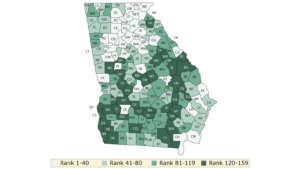Forsyth County is ranked as Georgia’s healthiest county for the sixth straight year.
The 2018 County Health Rankings, released Wednesday, again showed affluent suburban counties as Georgia’s healthiest.
After Forsyth, which is northeast of Atlanta, the next four are Oconee, Cherokee, Fayette, and Gwinnett counties. They are followed by Columbia, Cobb, Harris, Paulding and Coweta.

Those Top 10 are the same as last year’s, but in slightly different order.
The ninth annual rankings are produced by the Robert Wood Johnson Foundation and the University of Wisconsin Population Health Institute. The rankings look at factors other than medical care, such as education, transportation and poverty, that influence how long and how well people live.
It’s not surprising that the unhealthiest counties predominantly are in rural areas, and many lie in the southern part of the state.
The five Georgia counties in the poorest health, starting with least healthy, are Quitman, Warren, Crisp, Turner and Early. All are in Southwest or South Georgia except for Warren, which is in the eastern part of the state.
Last year’s rankings also had Quitman as the least healthy, followed by Randolph, Clay, Jefferson and Early. (Here’s a link to this year’s rankings.)
“We can’t be a healthy, thriving nation if we continue to leave entire communities and populations behind,” said Dr. Richard Besser, president and CEO of the Robert Wood Johnson Foundation. “Every community should use their County Health Rankings data, work together, and find solutions so that all babies, kids, and adults – regardless of their race or ethnicity – have the same opportunities to be healthy.”
Forsyth County’s statistics including an 11 percent uninsured rate, vs. 16 percent statewide; low rates of premature deaths, teen births and STDs; and just 7 percent of children living in poverty, vs. 23 percent statewide.

At the other end of the list, Quitman has a high rate of premature deaths and of low birthweight babies. Its uninsured rate is 19 percent, and 45 percent of its children are living in poverty.
The authors of the report card noted that children in poverty are less likely to have access to quality schools, and have fewer chances to be prepared for higher-wage jobs.
In Georgia, 23 percent of children live in poverty, compared with 20 percent nationally.
“This year’s county health rankings highlight the tremendous health disparities that persist in Georgia by zip code, race and ethnicity,’’ said Marsha Davis, an associate dean at the University of Georgia’s College of Public Health. “One of the key drivers of health status is poverty.”

“Until we improve the social and physical environments in which all Georgians live, their income, and their educational achievement, it is unlikely that we can improve their health,’’ Davis said. “This will require a close collaboration with public health, education, the private sector, economic development, chambers of commerce and other groups who may not have traditionally worked together.”

